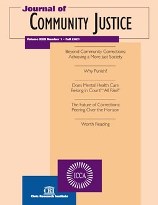Complete Issue
Author: Donald G. Evans.
Source: Volume 26, Number 04, Summer 2017 , pp.1-40(40)

< previous article |return to table of contents
Abstract:
This issue of JCC provides three thoughtful articles: the first covering the role that reentry workers’ motivation plays in their decision-making practices, the second studying the factors related to release outcomes, and the third providing an exploratory analysis of a questionnaire related to adherence to implementation drivers. There is also our regular Worth Reading column, which includes reviews of a number of recent books related to our field. In “The Impact of Public Service Motivation on Reentry Managers’ Decision-Making Practices” authors Marie Pryor and Naim Kapucu have provided us with a very informative and useful exploration into the effects of public service motivation in predicting decision making of reentry workers in the management of released offenders. Their study’s results support their hypothesis that reentry managers with higher public service motivation scores will be inclined to take an assistance-oriented approach with released offenders. This is a study that should be replicated because the implications of this exploratory effort show promise for understanding what and who might be effective in rehabilitative work. In “Factors Related to Release Outcomes Among Canadian Federally Sentenced Offenders” authors Jennie Thompson, Lynn Stewart, and Trina Forrester, from the Correctional Service of Canada, have contributed an informative article regarding factors related to release outcomes of offenders from Canadian prisons. Their study identifies factors associated with the revocation of conditional release for four groups: aboriginal and non-aboriginal men and aboriginal and non-aboriginal women. The study identifies profiles of offenders who require closer supervision, thus adhering to the risk principle in the effectiveness literature. The study also describes which dynamic factors are related to poor outcomes and should be targeted for change in keeping with the need principle. Study findings also indicate that risk factors associated with outcomes differ across the groups and differ depending on what outcome is examined. An understanding of these factors should aid in developing more effective supervision strategies. In their efforts to implement evidence-based practices, a number of jurisdictions have turned to Implementation Science and its drivers for assistance. Dr. Brandon Mathews discusses these implementation drivers in “The Implementation Drivers Adherence Questionnaire: Item Development and Exploratory Factor Analysis” and presents a questionnaire that helps users adhere to the drivers. This study reports on the item development and the exploratory factor analysis conducted. This instrument is an important first step in providing agencies with a useful tool to assist them in introducing evidence-based practices. It can provide useful feedback to managers to guide their implementation efforts, contribute to efforts to reduce recidivism, and increase positive change in offenders.Keywords: Public Service Motivation (PSM); Release Outcomes; Implementation Adherence
Affiliations:
1: Journal Editor.